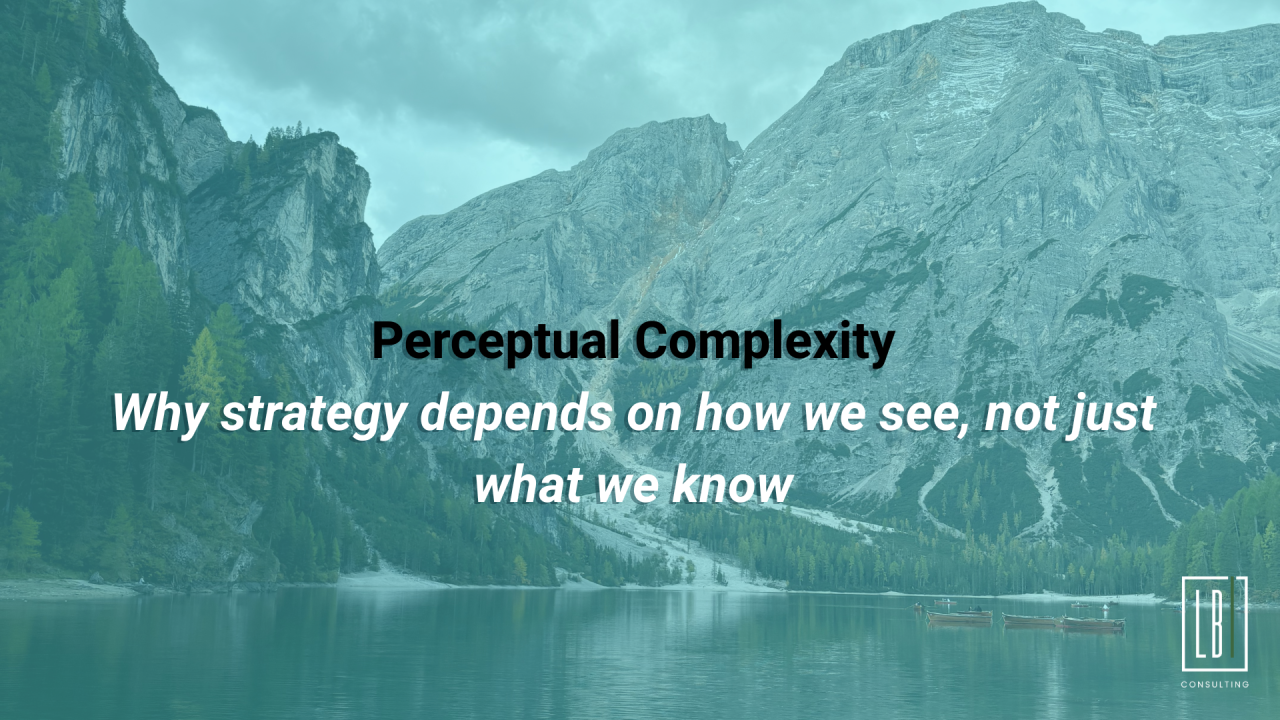
Insights on Strategy, Execution & Complex Organisations
I write about how strategy, execution and organisational design work in real-world environments — the kind that resist simple plans, reward systems thinking, and require leaders to adapt with clarity and purpose. Here you’ll find insights on strategic ambiguity, strategic manoeuvre, organisational viability, decision-making in complexity, and practical leadership thinking.
Browse the latest articles, or explore by topic below.
Start With Reality, Not Why
Many organisations start strategy with an inspiring purpose — and then wonder why execution fails. This piece explains how the gap between narrative and behaviour erodes coherence, damages trust, and weakens strategy at its core.
When Organisations Turn Unrestricted Warfare Inwards
The greatest threat to most organisations isn’t the external environment. It’s the unrestricted warfare they quietly turn on themselves.
In 1999, two People's Liberation Army (PLA) colonels wrote Unrestricted Warfare, arguing that in modern conflict, there are no fixed boundaries. Everything becomes a method: financial markets, media, regulation, culture, public opinion, networks, infrastructure, and even psychology.
The False God of Efficiency: Why Organisations Keep Sacrificing Their Future
Most organisations are so obsessed with efficiency that they destroy their ability to adapt. What leaders call productivity is often just fragility in disguise.
Modern organisations worship efficiency. They treat it as the highest virtue, the unquestioned indicator of a well-run organisation.
Execution is about adaptation, not control
Why execution fails when organisations stop adapting
We like to think that execution is the rational part of organisational activity. Strategy sets the direction, and execution is just doing what needs to be done. However, this idea only makes sense in a stable and predictable world.
When Strategy Stopped Meeting Reality
How comfort, control, and performance theatre stripped the movement out of strategy
Strategy was once a living craft. In ancient Greece, strategos described a commander who turned uncertainty, terrain, and limited resources to their advantage. It was not a concept to be discussed; it was a role to be lived. The strategist stood at the edge of the unknown, interpreting shifting conditions and acting through others to shape outcomes
Perceptual Complexity: Seeing Strategy from Different Mountains
Why strategy depends on how we see, not just what we know
I was walking around one of the lakes in the Dolomites when I noticed something quietly instructive. With every few steps along the path, the landscape shifted. The peaks that had seemed like one solid ridge unfolded into several layers. Valleys appeared where moments earlier there had been only shadow. What looked fixed from one vantage point changed shape entirely from another.
Strategy and the Cult of Nonsense
Most strategies are lies leaders tell themselves.
Strategy has been in an absurd state for some time. As I argued in 'How Marketing Hijacked Strategy,' somewhere along the way, the hard work of orienting organisations in complex environments was replaced with branding exercises masquerading as strategy. In my recent conversation with Paul Sweeneythe author of Magnetic Nonsense,
Organisation Shapes Strategy: Rethinking the Two-Way Relationship
On structural coupling, capability, and the real limits of choice
We often talk about strategy as if it comes first. Leaders design a strategy, and then “align” the organisation to deliver it. The familiar mantra is form follows function.
But the reality is more complex. Strategy and organisation are not linear. They are coupled.
Mike's presentation delves into the complexities of the modern business landscape, sharing insights and approaches that can help leaders navigate challenges effectively.
In complex and high-stakes environments, stability is an illusion. Reflecting on my experiences as a soldier in Afghanistan, this talk explores the challenges of adapting strategy and execution in the face of chaos, risk aversion, and an agile adversary.
Podcasts and Talks.
Apperences from our founder Mike Jones.
Systems Thinking and Strategy for Leaders : Join us for an insightful interview with Mike Jones, founder and director of LBI Consulting, as we dive into the world of systems thinking and strategy.
In this reflective solo episode, Mike Jones steps back from the guest chair to explore a deeper truth: strategy is failing long before execution begins.
Mike sees strategy not as a top-down process, where the wishes of management become the gospel of the employees: strategy emerges from the actions of all. In this process, the Viable System Model is a valuable tool to develop a strategy and Mike explains how.








